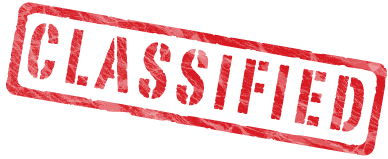Journalistic Ethics and Illegally Acquired Documents
Ed Driscoll, Jonathan Adler and Glenn Reynolds take the New York Times and other mainstream outlets to task for their decision to not republish the stolen emails from climate scientists on the grounds that they were illegally obtained and written with the expectation of being kept private. After all, these outlets famously publish illegally obtained classified national security information at the drop of a hat.
 While that’s a pretty persuasive critique on its face, the comparison is ultimately false.
While that’s a pretty persuasive critique on its face, the comparison is ultimately false.
In the case of the East Anglia listservs, the victims are private individuals. By contrast, the Pentagon Papers and various intelligence leaks published during the Bush era were owned by the United States Government and arguably kept secret partly to shield elected leaders from political fallout. Nor were the latter “stolen” in the same sense as the former. Rather, people authorized to receive the information shared it with reporters who are under no obligation to protect classified secrets.
What would be interesting is to see how the NYT and others handle illegally obtained documents from people with whom they don’t politically agree. Have they republished similarly stolen emails that were harmful to, say, tobacco companies or investment bankers?
If so, then were have a much better case for hypocrisy.



James;
I dare to suggest to you that the real contrast here is who such documents would expose. In every case when the new York times has decided to run with supposedly stolen documents it has been at the expense of the right, and to defend the left and it’s mantra. As such, their cries of morality regards all of this lose all credibility at the off.
How about the stolen Personal e-mails of Palin?
How about the illegally obtain information on Joe the Plumber? Please don’t give me the B.S. argument that the MSM decided Joe was a public figure therefore he was fair game.
They treat GOP candidate family different the DNC family.
The MSM are unethical liberal hacks. They can try to spend it any way they want but it won’t change that truth.
Actually, the e-mails might be the property of the University. You’d have to check with the University’s policy regarding e-mails. In that case it would seem harder to argue for privacy.
How about the illegal recording made by John and Alice Martin given to Jim McDermott who leaked it to several media outlets?
Here is the transcript of the tape on the NY Times website.
And the NY Times supported the illegal action in court.
From Jim McDermott’s wiki entry.
Did the NY Times publish the Palin e-mails? I couldn’t find them on their site.
I would point out that the story is on the front page of their web site, and they definitely have published damaging and embarrassing quotes from the e-mails.
As if being found guilty of hypocrisy might actually induce pangs of shame, conscience or guilt requiring an honorable penance.
James, there are omelettes to be made.
A list? Hmmm I admit I didn’t know that.
OK, question….
What the bleep makes us assume that the server was hacked, as opposed to the mails being capped by one of the folks on the list?
Uh, nothing. There are suggestions that it was an inside job.
The emails don’t sound like they are libelous or slanderous. As I understand, the tort of disclosure of private facts, the disclosure must involve something that is not of public interest or concern. To me it’s one thing to say the original action was illegal, but not republishing it.
What are the implications of bloggers and various forms of under-news reporting this incident, all the while MSM refuses to do so? Does the MSM lose credibility? Do two classes of informed consumer emerge?
What a lame post. James, I’ve recently started reading your blog regularly, but this post serves neither your nor TAC well. Of course the NYT and other media organs have published items illegally obtained. Do some basic research, dude. You’ve just lost a huge chunk of credibility here.
The work they (the supposed scientist/politicians) were performing was at a government facility paid for by grants. The information was kept on computers paid for with government money. All of that scientific data/political propaganda was subject to the Freedom of Information Act. You cannot steal sh*t that is free.
One of the commentors in the above lawyer links cites to Bartnicki v. Vopper (2001), in which the U.S. Supreme court held that a radio station was protected by the First Amendment in broacasting illegal wiretaps of a private conversation between the union president and union negotiator amidst contract negotiations for the school. It essentially is extending the rational of the pentagon papers to private communications involving matters of public concern.
Of the multitude of reasons they had not to publish, concerns about how they were obtained would not see to me to be high on the list.
Yes, which is why I said on Friday:
Course I said that not knowing it was a listserv list we were talking about.
As to the suggestion it was an inside job, lemme tell you… You certainly wouldn’t know that from the articles posted on Friday and Saturday on the topic. A look at Memeorandum for the period shows every single article from the press and most of the blog posts as well, used the word ‘hacked’. Seems to me a trifle early to be making such judgments, but …. ehhhh (shrug)
But now, look…If in fact that’s correct, and access was by someone who actually had rights to the list, it rather negates the idea that it was due to what James calls “Illegal access’, wouldn’t it? It would place it more firmly inside what I described in that same post on Friday, as the left’s ‘Pentagon Papers’. In both cases, the data was made public by someone who legally had access to it.
And Zels, you have a good point, which furthers mine. By definition, it IS government held data. Of course, the chances of such incriminating documents coming out even under a FOIA order remains a question, then, doesn’t it? The only reason anyone knew of this listserv thing at all, is its content was leaked.
Maybe it was a refounder?:)
I’m guessing climate scientists aren’t very big on computer security best-practices, probably more than one of them used “password” as their listserv password. It certainly wouldn’t surprise me at all of this was obtained through illegal access.
Then again, it wouldn’t surprise me at all if it was leaked by someone with access.
The fact that everyone is claiming it was hacked makes me believe that the source of the emails is also the source of the claim.
On a side note, if these were gathered from a listserv, you have no real expectation of privacy.
A reasonable point. Let’s examine that, by asking the question who would benefit by that data getting leaked. Certainly, those seeking to discredit the AGW myth would benefit and therefore when the server is publicly labeled as “hacked”, the reasons for the hackage seem fairly clear to the general public.
But let’s consider another scenario, shall we?
Does anyone think that it’s strictly coincidental that this ‘leak’ happens mere days from the global warming festival at Copenhagen? You know, the one where the Obama campaign rhetoric was bound to catch up with the reality of the situation, absent a plausible excuse for not being able to produce global warming law (Cap and
tradeTax. )This, after all, would be hardly the first leak of private data that would be both timely and fortuitous to Obama. Indeed, if this were the only incidence of this kind of happening, I’d not even suggest it. But there’ve been enough now to the point where it’s quite plausible.
I don’t see how this really helps Obama’s position in Copenhagen, as the leaks really don’t harm AGW at all, they only gave a new talking point to his opponents. His intellectual peers in Europe will still hold him to the science of the matter, this isn’t going to give him an out with them, nor do I believe it will give him an out with the American left.
As for the timing, It’s quite likely that is was intended to support plausible doubt ahead of Copenhagen, but only among those already predisposed to disbelieve in AGW, as again the leak doesn’t harm the science at all.
All in all, I see no reason to believe that the source of those emails released them to help Obama.
They harm the myth by exposing it as a fraud. Gives Obama political cover for having accomplished nothing in the matter.
Only they don’t expose it as a fraud. They don’t even expose the specific findings they talk about as fraud.
Again, the only people who will accept this as a reason not to pass cap and trade were already against cap and trade, Obama gains nothing from this.
But those numbers have been increasing. The cover provided is a politcal one… “Poor Barack, he’s facing such stiff opposition from the neanderthals in the US.”
And notice the great lenths to which the press tries to tack the blame for this on those who have labeled AGW the hoax it is.